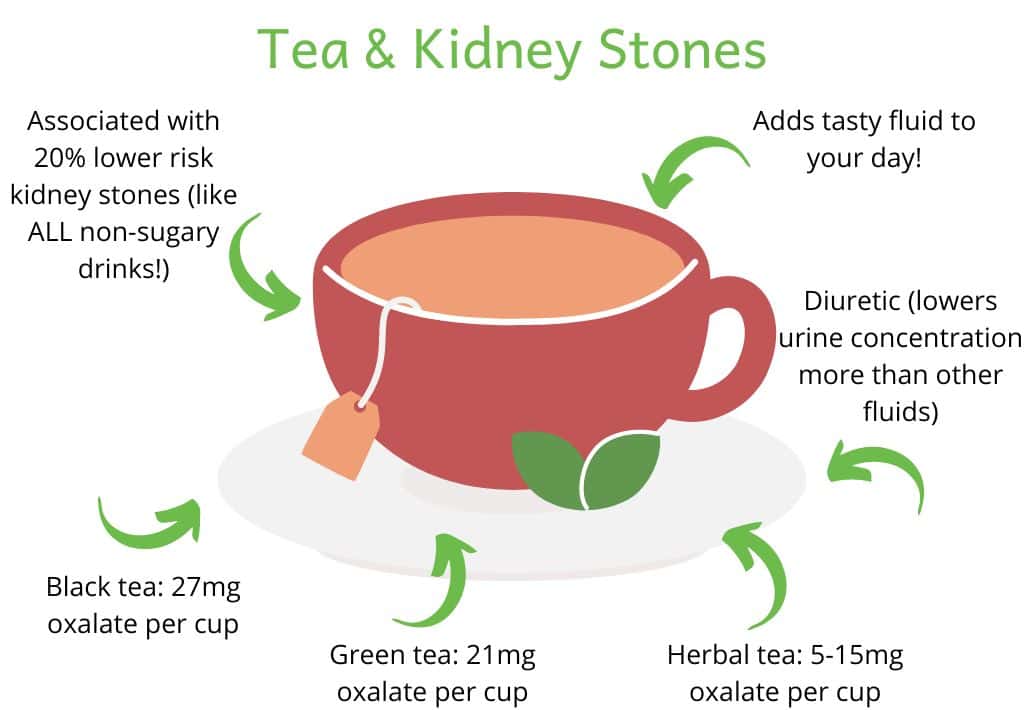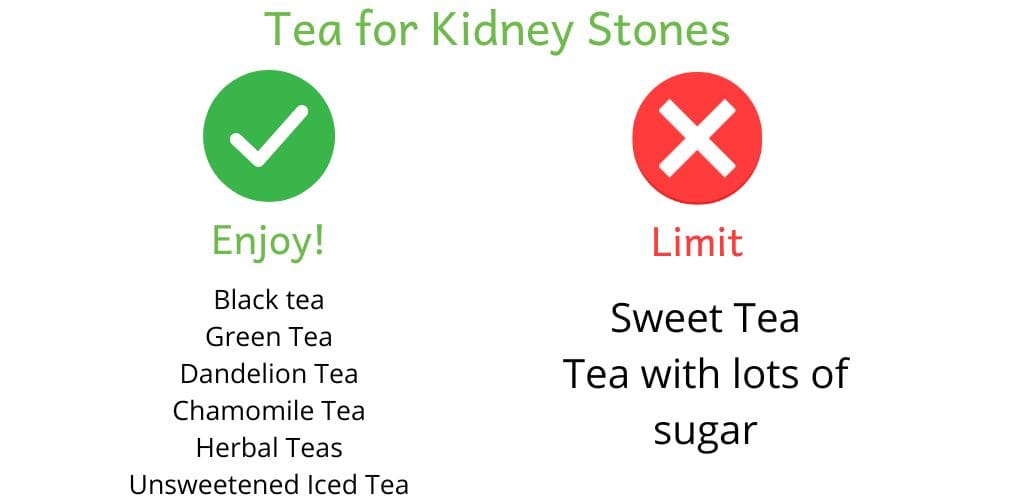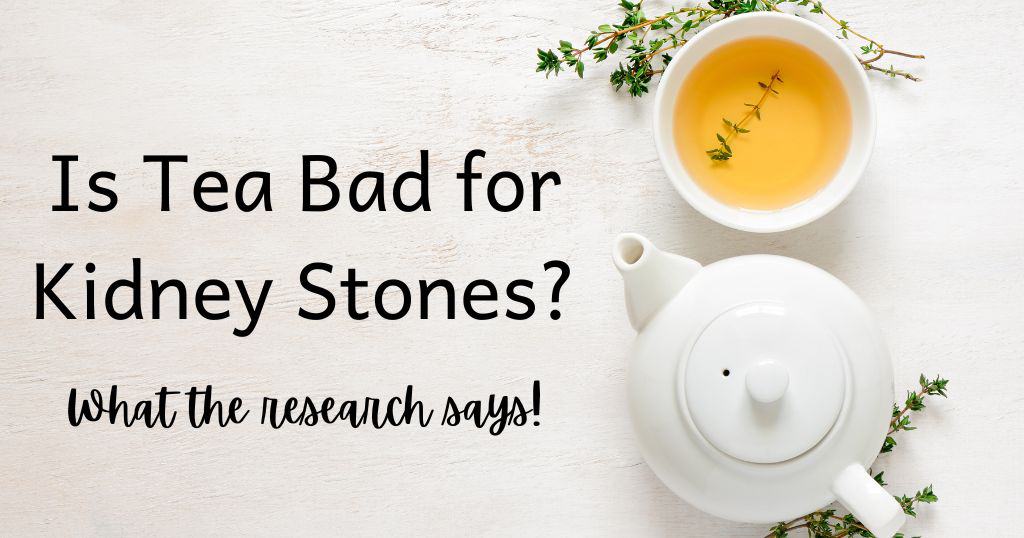You’ve probably read it a million times. Tea is “bad” for kidney stones. But, there are MANY different types of tea and different types of kidney stones. What is a tea-lover to do!?
Let’s dive into the science behind tea and kidney stones.
Table of Contents
Tea & Oxalate
Tea has such a bad reputation for kidney stones because of oxalate. One cup of black tea has about 27mg of oxalate.
Does this mean a kidney stone former should NEVER have tea? Of course not!
Simply because you have kidney stones does not mean you need to limit oxalate. In fact, even people who have oxalate kidney stones may not need to be on a low oxalate diet.
How can this be!? It comes down to WHY you are making kidney stones. Most people make kidney stones because of high urine calcium. They do not necessarily have high urine oxalate. Only a 24-hour urine test can clue us into WHY you make kidney stones.
Even if you DO have high urine oxalate on a 24-hour urine test, the goal is never to completely cut oxalate out of your diet. Instead, the goal is to limit those VERY high oxalate foods. It is even more important to make sure you are eating enough calcium.
The Data: Tea & Kidney Stones
Studies show the opposite of what you might expect for tea and kidney stones. A large 2013 study found that people who drank tea at least once a day had a 20% lower risk of kidney stones compared to people who drank it less than once a week (p=0.02). (1) This confirmed what earlier studies found. (2) (3)
Yep! A LOWER risk of kidney stones for tea drinkers!
How can this be!? One likely reason is simply that tea is fluid! The single most important thing you can do to prevent kidney stones is drink plenty of fluid. Drinking a lot dilutes your urine and reduces the risk of stones. All fluids, including tea, will dilute urine.
The other likely reason is the caffeine in tea. Both tea and coffee are consistently associated with a lower risk of kidney stones. (1) (2) (3) Caffeine is a a natural diuretic. Drinks that have caffeine dilute urine even more than non-caffeinated drinks. Of course, it is important to drink extra water to replace fluid lost from this diuretic effect.

Types of Tea & Kidney Stones
Of course, all tea is not the same. There are many different kinds of tea that can impact kidney stones differently. Let’s touch on the most common teas.
Black Tea
Black tea is the most common type of tea. It tends to have the most oxalate at 14-27mg oxalate per cup. However, this is still not a ton of oxalate compared to 750mg oxalate per 1/2 cup cooked spinach. Or, 120mg oxalate per ounce of almonds.
Oxalate content of tea will vary based on brewing time. Tea that is seeped for more time will be higher in oxalate.
A 2021 trial found that people who drank 1 1/2 liters of black tea per day did NOT have higher urine oxalate or overall bad changes to their entire urine chemistry. (4)
Even if you have high urine oxalate, a cup or two of black tea is unlikely to cause kidney stones. Ask your dietitian what is best for you! Or, learn more from me in Kidney Stone Nutrition School!
Green Tea
Green tea has slightly less oxalate than black tea. One cup has about 21mg oxalate. However, reasonable amounts of green tea is unlikely to cause kidney stones.
In fact, a 2021 review suggested green tea may be especially protective against kidney stones. (5) This data is not strong enough to recommend green tea for kidney stones. However, it makes it clear people with kidney stones do not need to STOP drinking green tea.
Dandelion Tea
A common home remedy for kidney stones is dandelion tea. However, there are no studies on dandelion tea and kidney stones.
I could not find a reliable source for the oxalate content of dandelion tea.
Chamomile Tea
Similarly, chamomile tea is touted to be good for kidney stones. But, there are no studies on chamomile tea and kidney stones.
I could not find a reliable source for the oxalate content of chamomile tea.
Herbal Tea
There are many different kinds of herbal tea. Oxalate content will vary, but is generally lower than black or green tea. Estimates of oxalate in herbal tea vary from 5-15mg per cup.
Because herbal teas add fluid, herbal tea is likely to lower the risk of kidney stones, similar to other types of tea.
Iced Tea
Iced tea can be made of any type of tea. Whether tea is iced or hot does not change its impact on kidney stones.
Sweet Tea
Drinks with sugar are the only kind of drink that are bad for kidney stones. Soda, punch and some juices are associated with a higher risk of kidney stones. (1) (2) (3)
Sweet tea has quite a bit of sugar in it. One cup has nearly 20g of added sugar. (6) Sweet tea should be reserved as a treat for people with kidney stones.

Twisted Tea, Kidney Stones & Alcohol
The alcoholic drink Twisted Tea has lots of sugar. A 12oz can has 23g of added sugar. This is about half of the recommended amount for the entire day. The first ingredient in Twisted Tea is brewed black tea. So, it is safe to assume there is about the same amount of oxalate in twisted tea as black tea.
Since sugary drinks can make most types of kidney stones worse, Twisted Tea is not the best option for kidney stones.
Alcohol in general is NOT bad for kidney stones. If you enjoy an adult beverage from time to time, kidney stones are no reason to stop. The only caveat is that alcoholic drinks can add quite a bit of sugar. Learn more about alcohol and kidney stones.
Can I Drink Tea with Kidney Stones?
In short – yes! Tea is absolutely ok for people with kidney stones. Tea is associated with a lower risk of kidney stones in many studies. (1) (2) (3)
It is best to choose tea with little or no added sugar.
If you have high urine oxalate, ask your dietitian how much tea is right for you! Chances are, you can enjoy 1-2 cups of tea per day. Add milk to help lower oxalate absorption.
What Else Can I Drink with Kidney Stones?
A good rule of thumb is that any drink that does not have added sugar is good for kidney stones.
Some of my favorite options are:
- Milk
- Unsweetened sparkling water
- Diet lemon-lime soda
- Coffee
- Tea
- Of course, WATER!
Learn more about the best drinks for kidney stones.
Happy Eating!
Melanie


Hi Melanie, Does Oolong tea have a lot of oxalates? I drink two cups of green tea a day. Have calcium oxalate stones .. Thank you for all of your information. I have learned a lot from you. Joyce Watts
As far as we know, it is not high in oxalate. However, please note that ALL tea is associated with a LOWER risk of stones (regardless of oxalate content).
hi Melanie, another tea question. my wife brews ginger tea for me from ginger root. I get all you say about tea in moderation but I want to avoid any situations where I am unknowingly adding a lot of oxalate. ginger as a spice doesn’t seem to have any huge oxalate red flags but again, I havent seen anyinfo on brewing from ginger root. sorry to be neurotic, just want to be safe!
paul
Hi Paul! I TRULY wouldn’t worry about this at all.
I just had PCNL surgeries this summer on both kidneys for large calcium oxalate monohydrate stones, with some calcium oxalate dihydrate. We will do testing in a month or so. I did have a 24 hr. study done earlier this year. The only thing my urologist and nephrologist have said is to hydrate as much as possible and limit sodium, try to not overdo protein and and increase calcium. I am so confused. I am signed up for the online seminar next week however it is during my work day and I may not be able to join in the entire time. Can you recommend which of your sites has the most general information that might help?
Hi Melinda! So good to meet you! Since you signed up for that class, you’ll definitely be emailed a link to watch a recording if you can’t make it live! In the meantime, this post has the most general information about calcium oxalate stones.
Looking forward to seeing you (live or otherwise!) on the class!
Melanie, I’m enjoying reading your work. I ate chickpeas and green peas everyday, I had a good amount for lunch and dinner. I read where you said that a low oxalate Bean can turn into a high oxalate Bean if I eat large amounts. I do hydrate a lot but should I start drinking lemon juice diluted in water as a preventative measure
hi
I know you recommend Crystal Light Lemonade as a good drink option due to its citric acid (i believe?). 2 questions:
1-how does that compare to a fresh squeezed lemon or ACV?
2-thoughts on the the chemicals in that, i think it was aspartame or splenda or something similar?
Thanks!
Hello! Citrate is only a good thing for people who have low urine citrate – and who do NOT have a high urine pH. One liter of Crystal Light is equivalent (citrate wise) to a 1/2 cup of fresh lemon juice. The amount of aspartame you get from a realistic consumption of Crystal Light really isn’t concerning. A fellow RD has a great article about this – and how the dangers have REALLY been overblown lately.
Thank you! What if only urine Ph is high, 8, but citrate normal at 385 (based upon 320-1240scale)? Also, Is that getting borderline low?
That is a VERY high urine pH. Depending on your urine calcium, I’d be VERY wary of adding large doses of citrate to your diet!
Hi
My calcium is high 347.
Citrate 385 (320-1240)
Got it! In that case, I would definitely NOT recommend citrate for you with that high pH. Instead, the best way to prevent stones for you is to do everything we can to get that urine calcium down (and, whatever else that urine test reveals!). I’d love to help you figure all of this out in Kidney Stone Nutrition School!
If urine pH is high and you dont recommend citrate supplements should one hold back on natural citrates in the diet? For example, squeezing lemons/limes and adding 1/2 cup of the juice/pulp to 2L of water with some Stevia.
Hi Pat. Great question! Depending on your urine citrate, pH and calcium levels, I would recommend discontinuing that much lemon juice. Of note, there is NO reason to stop eating actually citrus fruits!
is the oxalate content of Matcha Green Tea much higher then regular brewed green tea since you are drinking the actual tea leafs in Matcha green tea. The reason for my concern is that on my 24 hr urine test my oxalate level was 53 and I have a cup of Matcha green tea in the morning.
Thanks for the info
I don’t have an accurate oxalate level for this – so cannot say for sure. I always recommend focusing on calcium FIRST to help get that urine oxalate down – as this tends to be a much more effective way to lower urine oxalate and prevent stones rather than stressing about the oxalate content of everything you eat/drink.
If urine oxalate is not high, should you still do calcium?
What about if pH is high and oxalate is low? i couldn’t find anything on that, should you not take in any lemon juice or citrate?
It is really hard for me to answer these questions without the context of your 24-hour urine as a whole. I have a couple resources to help you better understand your 24-hour urine test results. My Kidney Stone Diet Guide does just this! Or, Kidney Stone Nutrition School is my more comprehensive dive into those test results and how to actually MAKE the changes you need to make to prevent stones. You can learn more about both of these options here.
Is Herbal Turmeric Tea a concern for stones?
If you were drinking a TON of it. Turmeric is actually very high in oxalate. But if you are having just a few cups a day, I can’t imagine it would be an issue. I’d have to check out your 24 hour urine test to know for sure!
It was massive doses of a turmeric supplement for pain that was the trigger for my stones. If it’s just as a spice mixed with other teas, you’re probably okay. Oxalate is my only risk factor, confirmed with a 24 hour urine collection for kidney stone risk. I do consume some spice blends that have a little turmeric, but occasionally. I know that I am spooked, but my experience with consuming turmeric on a daily basis definitely contributed to my stones. By limiting sodium, added sugar, reasonable amounts of meat, and keeping oxalate low, I am stone-free for five years.
What about a weak rose hips tea? It helps settle my stomach. I only use about 1/10 of a tea bag and make it very weak or even dilute it further with water.
This would fall under “herbal tea”!
I read a study on iced tea and kidney stone in the deep south USA back in the 1970s at the medical school library in San Antonio. I was employed at the VA Hospital just across the street. It was then that I stopped Lipton Iced Tea, which has been served by Mom for evening meals at home in San Antonio. I also was in the habit of playing sports (basketball, tennis, softball) and drinking ice tea (Lipton) to hydrate after exercise. This was about 1976. My first stone was in 1969 while still in 12 grade. I now drink lemonade to hydrate and am not active in sports at age 71. I am also on Potassium Citrate and Hydrochlorothiazide prescribed by a Nephrologist at Austin Kidney Associates base on 24 hour urine tests.
I recently passed a 7mm kidney stone that was the worst thing I have ever been through in my life. The results came back as a calcium stone, but my blood work showed the calcium level was normal. My doctor thought it could be the sun tea I make with black tea. I drank quite a bit in a day. She also stated this stone could have been in my kidney for some years. Should I switch to herbal tea sun tea instead?
Hi Rosemarie. Your blood calcium actually says NOTHING about your kidney stone risk. We really need a 24-hour urine test to know what caused your stones. Unless you were drinking a TON of this black tea – along with a diet inadequate in calcium and many other super high oxalate foods, I doubt just this sun tea caused your stones. We really need that 24-hour urine test to know what you should do!
What about chai tea ? It does have milk in it .
Yum! I love chai tea! Chai tea is essentially black tea with some milk, spices and sugar. The sugar in it would be my biggest hesitation for most people. If you love it, you’d just need to learn how to incorporate it into your day – based on your 24-hour urine test results.
I have read that instant tea does not have near as much oxalate as brewed tea. Any thoughts on instant tea?
Hi Jim! My sources agree with you! One cup of instant tea has about 5mg oxalate.
Thank you for all of your helpful info!
What about some honey in the tea?
Honey is just sugar. So, that is totally fine – but you would just need to learn how to incorporate that sugar into your day!
THIS IS VERY INTERESTING. I DID NOT KNOW THERE WAS A LINK BETWEEN TEA AND KIDNEY STONES. AND QUESTION, IS DCAFFEINATED BLACK TEA SAFE WITH KIDNEY STONES?
As far as I know, decaffeinated black tea has the same oxalate as caffeinated black tea. So, my comments about black tea are the same.
what about white tea?
I don’t have an accurate oxalate count on white tea – but my thoughts would be similar to my comments on black or green tea!